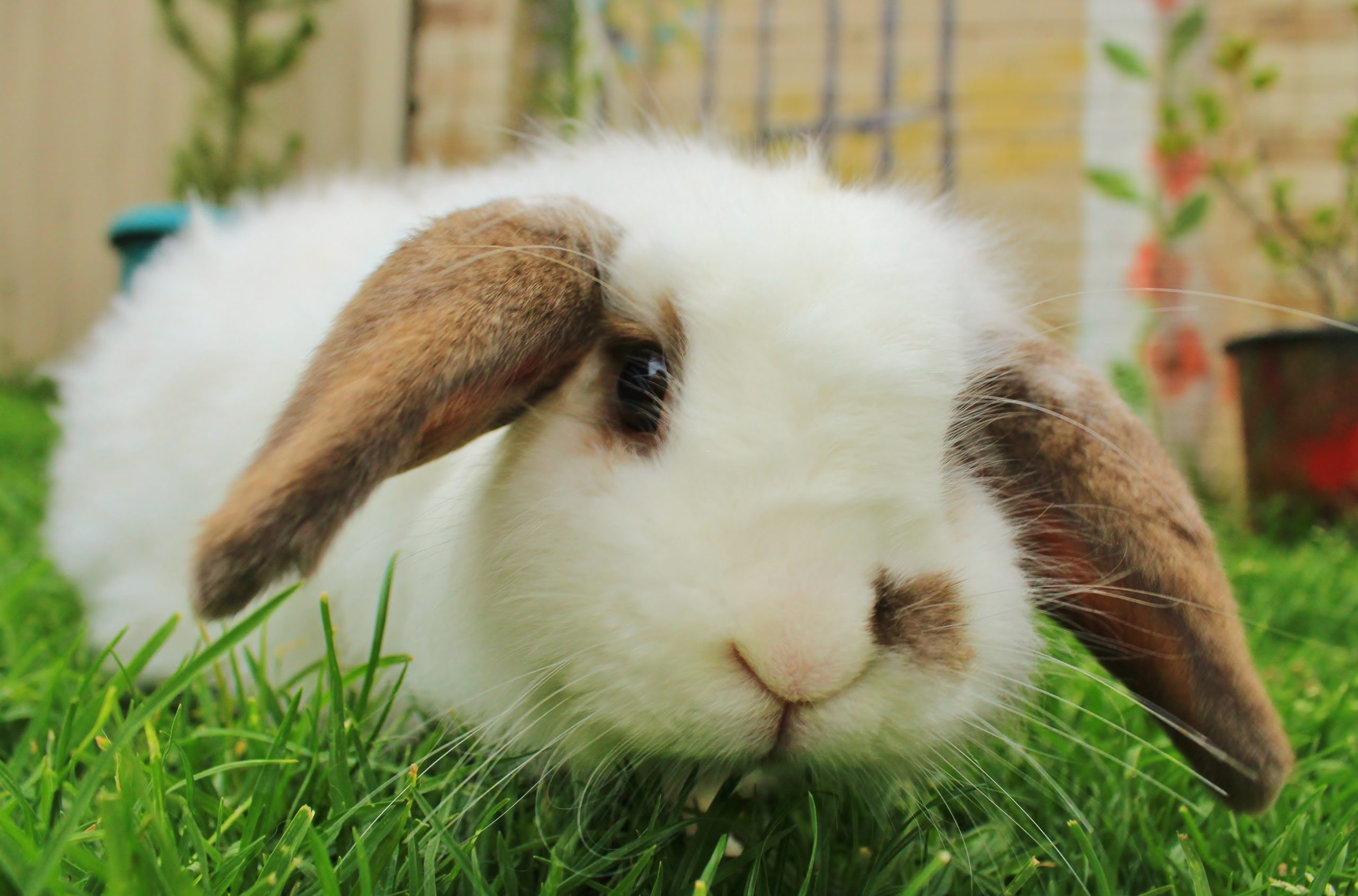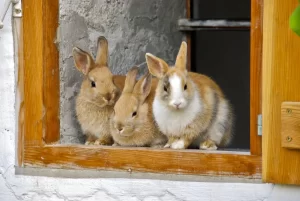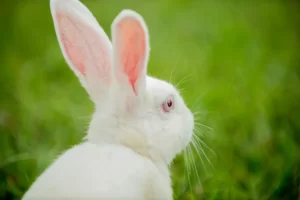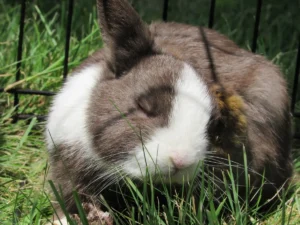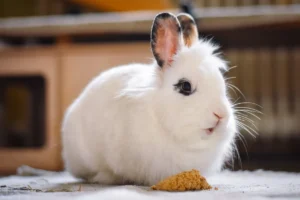Do you ever wonder if your rabbit really likes you? It can be difficult to know for sure, but there are some signs to watch out for. From body language cues to bonding behaviors, this article will guide you on how to tell if your rabbit is truly fond of you.
By understanding their vocalizations, facial expressions, and interactions with you and your space, you'll be able to build a stronger bond with your furry friend.
Key Takeaways
- Tail wagging, binkying, and zooming are signs of contentment and happiness in rabbits.
- Relaxed ears, a contented posture, and closed eyes indicate that a rabbit is fond of you and feels secure.
- Gentle grooming, nuzzling, and licking are bonding behaviors that show affection and trust.
- Seeking attention, following you, and initiating games are positive indications that a rabbit desires companionship and enjoys your presence.
Body Language Cues to Watch for
You can tell if your rabbit likes you by paying attention to their body language cues. One of the key signals to look out for is tail wagging. Contrary to popular belief, rabbits don't wag their tails like dogs. Instead, a rabbit's tail wagging is a sign of contentment and happiness. When your rabbit wags its tail, it means they feel comfortable and at ease in your presence.
Another important indicator of your rabbit's affection is their playful behaviors. If your rabbit engages in playful activities, such as binkying (jumping and twisting in mid-air) or zooming around the room, it shows that they feel safe and secure around you. Playful behaviors also indicate that your rabbit is enjoying your company and wants to interact with you.
Bonding Behaviors to Look Out for
Notice when your rabbit nuzzles against you or licks your hand, as these are bonding behaviors to look out for. Playful interactions are another clear sign that your rabbit likes you. If your rabbit initiates games, such as chasing or nudging toys towards you, it's a positive indication that they enjoy spending time with you.
Pay attention to the frequency of your rabbit seeking attention from you. If they actively seek your company and follow you around, it demonstrates their desire for your companionship. Rabbits are social animals, and seeking attention from their human caregivers is a way for them to communicate their affection and trust.
Bonding behaviors like nuzzling, licking, engaging in playful interactions, and seeking attention are all signs that your rabbit genuinely likes you and enjoys your company.
Signs of Contentment and Trust
When your rabbit flops onto their side or back and relaxes in your presence, it's a clear indication of contentment and trust. Building a strong bond with your rabbit is crucial for their well-being and overall happiness. Understanding their signs of affection can help you deepen your connection.
Here are some signs to look out for:
- Purring: Just like cats, rabbits can purr when they're happy and relaxed. Listen for a soft, rhythmic sound that indicates contentment.
- Grooming: Rabbits groom each other as a sign of affection. If your rabbit starts grooming you or allows you to groom them, it means they trust you.
- Binkying: A binky is a joyful leap and twist in the air. If your rabbit binkies around you, it shows they're comfortable and happy in your presence.
Recognizing these signs won't only strengthen your bond but also ensure a fulfilling relationship with your rabbit. Remember to be patient and gentle, and your rabbit will shower you with affection.
Understanding Vocalizations and Sounds
Listen closely to the sounds your rabbit makes, as they can communicate their feelings through different vocalizations such as purring, grunting, or honking. Recognizing distress signals is crucial in understanding your rabbit's needs and ensuring their well-being.
When a rabbit is distressed, they may emit high-pitched squeals or aggressive growling sounds. It's essential to differentiate between communication and aggression. While rabbits may growl or grunt during play or territorial disputes, prolonged aggression signals a deeper issue.
Pay attention to their body language, such as flattened ears, raised fur, or a tense posture. If you notice these signs along with aggressive vocalizations, it's important to address the situation promptly and seek professional advice.
Reading Facial Expressions and Eye Contact
You can understand your rabbit's emotions by observing their facial expressions and making eye contact. Rabbits communicate a lot through their body language, and their face is a great indicator of how they're feeling. Here are some key things to look for:
- **Eyes:** When your rabbit looks at you with relaxed, half-closed eyes, it's a sign of contentment and trust. However, wide-open eyes with dilated pupils can indicate fear or aggression.
- **Ears:** Pay attention to your rabbit's ear positions. If their ears are upright and alert, it means they're curious and interested. If their ears are flat against their head, it could mean they're scared or angry.
- **Mouth and Whiskers:** A rabbit with a relaxed mouth and whiskers that are neither forward nor backward is generally feeling calm and comfortable. But if their mouth is tightly closed, or their whiskers are pulled back, it might mean they're stressed or unhappy.
The Importance of Grooming and Nuzzling
Grooming and nuzzling are important ways for rabbits to bond with their human caregivers and show affection. These behaviors serve as a means of physical touch, which has various benefits for both rabbits and humans. Physical touch releases oxytocin, a hormone known for promoting feelings of trust and relaxation.
When your rabbit grooms you, it's a sign that they feel safe and comfortable in your presence. They're also marking you as part of their social group.
Nuzzling, on the other hand, can have different interpretations. If your rabbit nuzzles your hand gently, it's a sign of affection and trust. However, if the nuzzling becomes more forceful or aggressive, it may indicate that they're seeking attention or trying to assert dominance.
Pay attention to your rabbit's body language and respond accordingly to strengthen your bond and meet their needs.
How Your Rabbit Interacts With You and Your Space
As your rabbit explores your space, they may hop around, sniff objects, and even chew on things they shouldn't. Interacting with your rabbit during playtime activities is crucial for bonding and understanding their behavior. Here are some ways your rabbit may interact with you and your space:
- **Binkying**: Your rabbit may perform joyful leaps and twists in the air, known as binkying, to show their happiness and excitement.
- **Nudging**: Your rabbit may nudge you gently with their nose, signaling their trust and affection towards you.
- **Exploring**: Rabbits are curious creatures and enjoy exploring their surroundings. They may hop into small spaces or investigate new objects in your home.
Establishing a routine for playtime activities will help create a sense of structure and predictability for your rabbit. This routine could include daily play sessions, interactive toys, and designated play areas. By engaging in these activities, you can strengthen the bond with your rabbit and provide them with mental and physical stimulation.
Frequently Asked Questions
How Often Should I Groom My Rabbit?
You should groom your rabbit regularly to keep their fur clean and free from mats. Signs of stress in rabbits may include excessive shedding or changes in appetite. Regular grooming can help prevent these issues.
What Are Some Common Vocalizations That Rabbits Make and What Do They Mean?
Different types of rabbit vocalizations can indicate their emotions and needs. Understanding rabbit body language is crucial to interpreting these vocalizations. Pay attention to their sounds and behaviors to better understand your rabbit.
Can Rabbits Show Affection Towards Other Animals?
Rabbits and other animals, how do they interact? Can rabbits form strong bonds with non-rabbit pets? Yes, rabbits can show affection towards other animals, forming close relationships based on trust and companionship.
How Do I Know if My Rabbit Is Comfortable With Being Held?
To know if your rabbit is comfortable being held, observe its body language cues like relaxed posture and grooming. Gradually acclimate it to being held by starting with short sessions and providing treats.
Is It Normal for My Rabbit to Have a Favorite Spot in the House?
It's completely normal for rabbits to have a favorite spot in the house. They are territorial animals and tend to establish their own little space. It's a sign of their comfort and familiarity in their surroundings.
Conclusion
In conclusion, understanding your rabbit's body language, bonding behaviors, and vocalizations can help you determine if your rabbit truly likes you.
One interesting statistic to evoke an emotional response is that studies have shown that rabbits who feel loved and cared for by their owners are more likely to exhibit signs of contentment and trust.
Building a strong bond with your rabbit isn't only important for their well-being but also for a fulfilling and rewarding pet-owner relationship.

